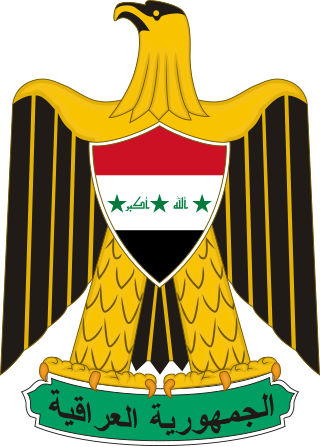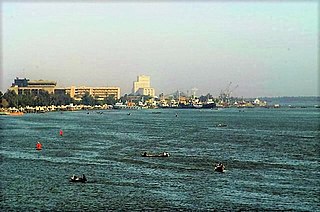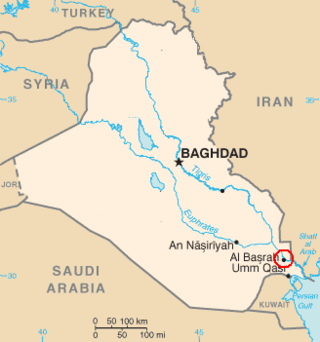
The president of the Republic of Iraq is the head of state of Iraq and "safeguards the commitment to the Constitution and the preservation of Iraq's independence, sovereignty, unity, the security of its territories in accordance with the provisions of the Constitution". The president is elected by the Council of Representatives by a two-thirds majority, and is limited to two four-year terms. The president is responsible for ratifying treaties and laws passed by the Council of Representatives, issues pardons on the recommendation of the prime minister, and performs the "duty of the High Command of the armed forces for ceremonial and honorary purposes". Since the mid-2000s, the presidency is primarily a symbolic office, as the position does not possess significant power within the country according to the October 2005-adopted constitution. By convention, though not by any official legal requirement, the office is expected to be held by a Kurd.

The Occupation of Iraq (2003–2011) was characterized by a large United States military deployment on Iraqi territory, beginning with the US-led invasion of the country in March 2003 which overthrew the Ba'ath Party government of Saddam Hussein and ending with the departure of US troops from the country in 2011. Troops for the occupation came primarily from the United States, the United Kingdom, and Australia, but 29 other nations also provided troops, and there were varying levels of assistance from Japan and other countries, as well as tens of thousands of private military company personnel.

Abdul Latif Rashid, also known as Latif Rashid, is an Iraqi politician and the ninth president of Iraq, following the 2022 Iraqi presidential election. He was previously the Minister of Water Resources under the government of Nouri al-Maliki. Before that, he served in the same position under both the Iraqi Transitional Government and the Iraqi Interim Government. Rashid was formerly a spokesperson for the Patriotic Union of Kurdistan (PUK) in the United Kingdom.

The Iraqi Interim Government was created by the United States and its coalition allies as a caretaker government to govern Iraq until the drafting of the new constitution following the National Assembly election conducted on January 30, 2005. The Iraqi Interim Government itself took the place of the Coalition Provisional Authority on June 28, 2004, and was replaced by the Iraqi Transitional Government on May 3, 2005.

The Iraqi National Intelligence Service is the chief intelligence agency of Iraq. It was created with the help of the CIA to replace the Mukhabarat, after the latter was dissolved.

The National Iraqi Alliance, also known as the Watani List, is an Iraqi electoral coalition that contested the 2010 Iraqi legislative election. The Alliance is mainly composed of Shi'a Islamist parties. The alliance was created by the Supreme Council for Islamic Revolution in Iraq to contest in the January 2005 and December 2005 under the name United Iraqi Alliance, when it included all Iraq's major Shi'a parties. The United Iraqi Alliance won both those of elections however later fell apart after several major parties left the alliance due to disputes with Prime Minister Nouri al-Maliki and the Supreme Council.

Governorate council elections were held in Iraq on 30 January 2005, the same day as the elections for the transitional Iraqi National Assembly. The Governorate for each province has a 41-member council, except for Baghdad, whose council has 51 members.

Marshal of the Royal Air Force Graham Eric Stirrup, Baron Stirrup,, informally known as Jock Stirrup, is a former senior Royal Air Force commander who was the Chief of the Defence Staff from 2006 until his retirement in late 2010. He is now a Crossbench member of the House of Lords. In April 2013, he was appointed a Knight Companion of the Order of the Garter by Queen Elizabeth II.
Abdul-Latif Ali al-Mayah was a humanities professor born in Basra, who became chairman of the Arab World Research and Studies Centre at Mustansiriya University and head of the Baghdad Centre for Human Rights. He was an outspoken critic of the Iraq Interim Governing Council, which was the provisional government of Iraq from 2003 to 2004, established by the US-led multinational coalition occupying Iraq, following the 2003 Invasion of Iraq. He was assassinated on January 19, 2004.

The Iraq Football Association (IFA) is the governing body of football in Iraq, controlling the Iraqi national team and the Iraqi football league system. The Iraqi Football Association was founded in 1948 and has been a member of FIFA since 1950, the Asian Football Confederation since 1970, and the Sub-confederation regional body West Asian Football Federation since 2001. Iraq is also part of the Union of Arab Football Associations and the Arab Gulf Cup Football Federation. The Iraqi team is commonly known as Usood Al-Rafidain, which literally means Lions of Mesopotamia.
Since the 2003 invasion of Iraq, Iraqi academics have frequently been threatened with violence, kidnapped, or murdered. Although it is impossible to determine the exact scale of the violence and intimidation, the Iraqi Ministry of Higher Education reported that over 3,250 academics had fled the country between February and August 2006. According to the Iraqi Association of University Lecturers about 300 academics, including Ph.D.'s working in Iraqi government ministries and university administrators, had been killed before January, 2007. Other, less reliable, sources have placed the death toll as low as 20 and as high as 1,000.

The Battle of Basra lasted from 21 March to 6 April 2003 and was one of the first battles of the 2003 invasion of Iraq. The British 7 Armoured Brigade fought their way into Iraq's second-largest city, Basra, on 6 April coming under constant attack by the Iraqi Army 51st Division and Fedayeen Saddam, while elements of the Parachute Regiment cleared the 'old quarter' of the city that was inaccessible to vehicles. Entering Basra had only been achieved after two weeks of conflict, which included the biggest tank battle of the war by British forces when the Royal Scots Dragoon Guards destroyed 14 abandoned Iraqi tanks on the 27 March.

Governorate or provincial elections were held in Iraq on 31 January 2009, to replace the local councils in fourteen of the eighteen governorates of Iraq that were elected in the 2005 Iraqi governorate elections. 14,431 candidates, including 3,912 women, contested 440 seats. The candidates came from over 400 parties, 75% of which were newly formed.

The Battle of Basra began on 25 March 2008, when the Iraqi Army launched an operation to drive the Mahdi Army militia out of the southern Iraqi city of Basra. The operation was the first major operation to be planned and carried out by the Iraqi Army since the invasion of 2003.
Abu Mustafa al-Sheibani also known as Hamid Thajil Warij al-Attabi or Hamid al-Sheibani is an Iraqi Shi'a leader who commands his own insurgent group and smuggling network known as the Sheibani Network, which became one of the Iraqi Special Groups. An arrest warrant was issued for him by the Central Criminal Court of Iraq on 12 April 2005 with a reward of $200,000 for information leading to his capture. In 2006 he was added to the Iraqi government's 41 Most-Wanted list. He holds both Iraqi and Iranian nationalities because he lived in exile in Iran during Saddam Hussein's rule, and later returned there to live in Tehran after 2006. In September 2010, after Iraqi Prime Minister Nouri al-Maliki formed a coalition government with Shi'a rebel leader Muqtada al-Sadr, Sheibani was allowed to return to Iraq along with Abu Deraa.

The Devil's Double is a 2011 English-language film directed by Lee Tamahori, written by Michael Thomas, and starring Dominic Cooper in the dual role of Uday Hussein and Latif Yahia. It was released on 22 January 2011 at the 2011 Sundance Film Festival and was released in limited theaters on 29 July 2011 by Lionsgate and Herrick Entertainment to mixed critic reviews.

Jamal Naser Delli Ahmed Al-Karboli is an Iraqi activist and politician, head of the National Movement for Development and Reform party and the Iraqi List coalition in the Council of Representatives of Iraq.
Walid Hamid Tawfiq al-Nasiri al-Tikriti was the Governor of Basra from September 2002 to April 2003 and the Director of the Iraqi Special Security Organization from June 2001 to September 2002.

Rafi ibn Abd al-Latif ibn Talfah (Arabic: رافع عبد اللطيف طلفاح التكريتي; born in 1954 in Tikrit) was the last head of the Iraqi Directorate of General Security secret police force at the end of President Saddam Hussein's reign. A maternal cousin of Saddam, Rafi went into hiding during the Iraq War, when a United States-led Coalition invaded the country and overthrew Saddam Hussein's government. A key aide to General al-Douri, Rafi al-Tikriti provided information and actionable intelligence on anti-regime individuals and opposition groups in each governorate of Iraq, particularly Kurdish, Iranian, and Turkmen.

Between the parliamentary election in October 2021 and October 2022, there was a political crisis in Iraq, with members of the Council of Representatives of Iraq being unable to form a stable coalition government, or elect a new President. Basic government services such as the civil service and military continued functioning, but the national political system was in deadlock including in respect of almost all major spending and taxation issues. On 27 October 2022, the government of Prime Minister Mohammed Shia' Al Sudani was approved by the Council of Representatives.















